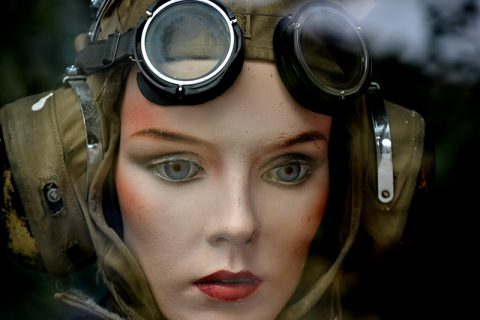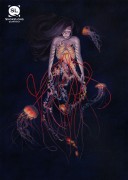Your story has a quality that I always appreciate when I see it in flash fiction—the world in which it lives feels larger than the work itself. How did the environment of this story take shape?
Well, while writing the story I had in mind Korea and the high school where I teach. That’s not to say the setting is Korea. It’s just what I was picturing while writing the scenes. It’s maybe the first story I wrote that’s connected to Korea in this way. I’ve written stories with like expat-characters in Korea, even a novel set in Korea about a Korean woman, which more than anything else was just an exercise for me. Anyway, I think that’s where the “wildness” in the story originated. I think the story has that sort of muted, uncertain feeling that comes with being an expat. The world maybe feels “larger” because my Korea-world feels much bigger and much more unknowable than the one I felt while living in America. I was grappling with that sort of thing.
The story is in near constant motion, much of it angry, violent, or both. Was that a challenge to navigate?
I remember that, when I started writing, I was doing these really spare stories that were almost entirely simple action and dialogue. At some point, I started trying to write more interior-focused, character-driven stories. I don’t know why. I’m not so good at that. Ruminating on stuff isn’t a strength of mine. Around Halloween last year, I read a story by Ben Loory in Wigleaf that was so perfect and direct, and my first thought was that I’d gotten away from what I really wanted to be doing. I was in the middle of a novel at that point, but I dropped the current thing and started writing stories. It was sort of a return to where I started. It was very pleasurable to focus on motion again. This was the first story I wrote after reading the one by Loory.
There is only one character who has a given name. Is naming (or not) an important part of your process?
No, I guess it’s not. Names aren’t something I spend a whole lot of time on. The girl names the egg and that feels important because it feels like an intimate thing: especially because she is only using the name while alone. It’s like confirmation that the bond is real and hers. These days, most of what I’m writing includes no names at all. They’re stories maybe around two to three thousand words. They’re all focused on situations, like looking at a single situation from all the different angles. I don’t want to clutter things up with too much character-stuff. My default is to create a name only when the name is necessary for some other, larger effect, I suppose.
There are still a few people out there who don’t like fantastical elements in their literary fiction. What do you think they miss out on the most?
It’s good if the stories have one odd thing, and then everything else is recognizable. Then it’s very interesting to see one aspect of our lives and/or societies amplified. The fantastical stuff usually helps us to reflect on what our lives are. It also opens up many opportunities for humor. Or, no, all the emotions. The last story I wrote is about a couple introducing their parents to one another. And they’re in a sushi restaurant, and in the restaurant is a dead whale. And by having the people talk about the whale, I believe I was able to explore a lot of different feelings: about embarrassment, frustration, sadness, happiness, gratitude. I couldn’t write a story about introducing parents without something like a whale. And if I read one about introducing parents without something like a whale, I’d probably not get it. Or connect with it fully. I sort of need the odd element to keep me oriented.
You live and teach in Seoul. What is it like to be a fiction writer there?
It’s kind of like being a fiction writer in Ucross, Wyoming, which was where I lived right before Korea. Equally inspiring. Equally challenging. There are writing groups around. I went to one for a while, then organized it for a few months, but not anymore. I met some great people when I went. There aren’t many readings. Someone needs to get a series going, haha. I saw Han Kang read last year. She was amazing. Some people set up an online mag for expats in Korea called Imminent Quarterly. In general, though, regarding writing, I’m in my apartment and on the internet. Sometimes it’s lonely and sometimes it’s the best. A writer I met here who lives in China now is setting up an online mag with me that’s based on like outsider/expat work. It’s called Problem House. It should be up soon. Sorry for the messy answer.
What’s something you’ve read lately that you’re still thinking about, and why?
I read Cheryl Strayed’s Brave Enough recently. Now it’s The Hen Who Dreamed She Could Fly, by Sun-Mi Hwang. This time last year, I was reading lots of sad, dark stuff. I’m on to brighter stories now. That’s the connective tissue. I’m not sure how to account for the shift. It’s nice, though. I’ll read Valeria Luiselli’s The Story of My Teeth next. And I read a lot of stuff online. I like Hobart, The Offing, Wigleaf, Paper Darts, and a bunch of others. This has kind of been a messy answer, too. I’ll end it by recommending Jung-Il Jang’s When Adam Opens His Eyes, which I read last year. It’s part of the Library of Korean Literature series from Dalkey Archive. It’s about a guy coming of age in a society he doesn’t feel he belongs to. It’s such an honest and surprising book. And Georges Bataille is a big part of it, particularly in the last quarter, which is brave and moving. I loved Georges Bataille’s novel when I was in college.



 The core workshop of SmokeLong Fitness is all in writing, so you can take part from anywhere at anytime. We are excited about creating a supportive, consistent and structured environment for flash writers to work on their craft in a community. We are thrilled and proud to say that our workshop participants have won, placed, or been listed in every major flash competition. Community works.
The core workshop of SmokeLong Fitness is all in writing, so you can take part from anywhere at anytime. We are excited about creating a supportive, consistent and structured environment for flash writers to work on their craft in a community. We are thrilled and proud to say that our workshop participants have won, placed, or been listed in every major flash competition. Community works.